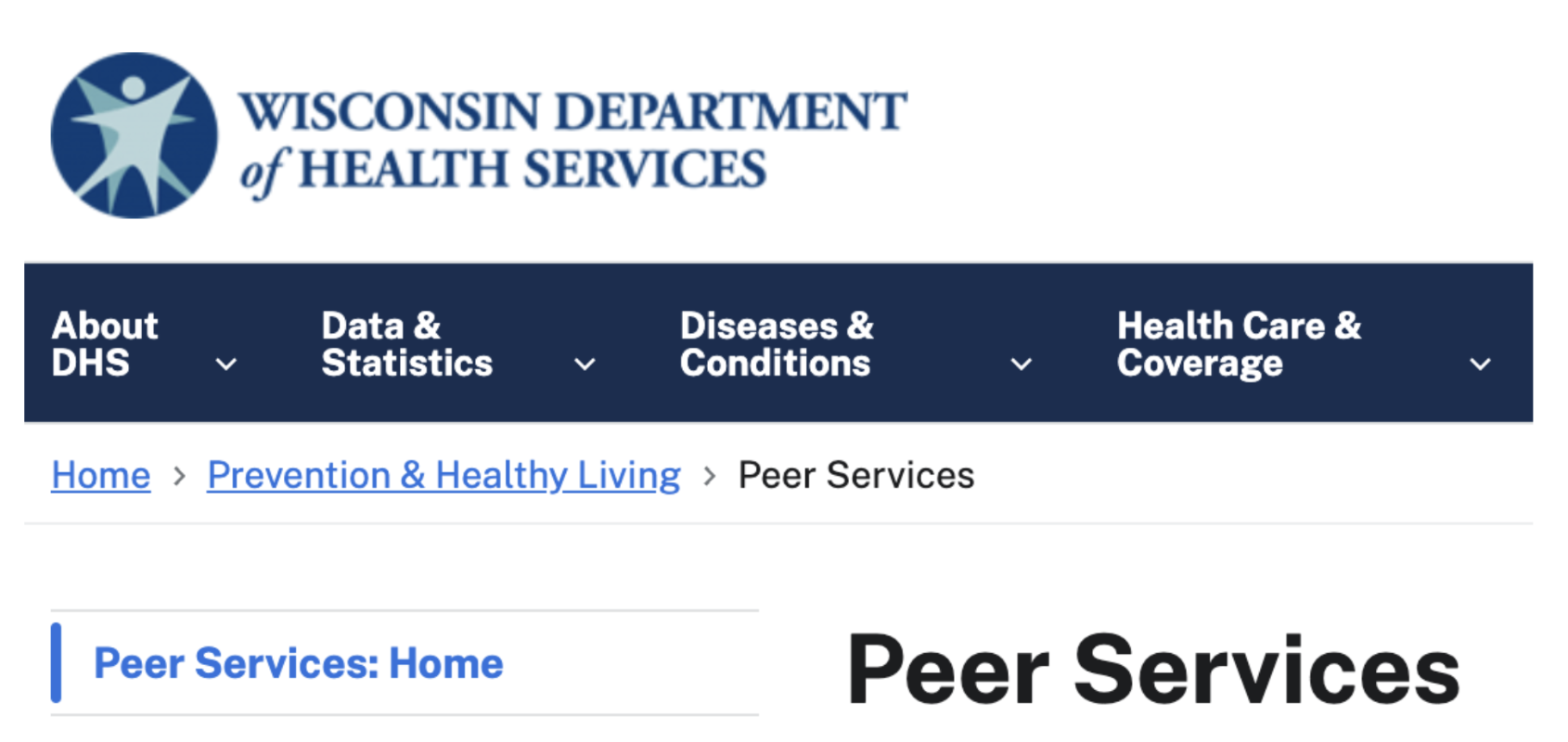Wisconsin: Medicaid Peer Support Services are only covered under “state plan” organizations
Wisconsin Medicaid covers peer support services for addiction treatment patients. The state runs peer recovery centers, peer-run respites, and also operates a peer-run warmline in addition to offering coverage for peer support services delivered in Medicaid-approved programs. There is no copay for peer support services in Wisconsin.
However, according to the KFF website database, Wisconsin Medicaid will only cover peer support services that are a part of the “State Plan” - whether that’s psychosocial rehab, residential SUD treatment or SUD health home services. If your organization isn’t included on the “State Plan,” then it’s not possible to receive reimbursement for peer support services rendered. This limitation can be a deal-breaker for many sober living and addiction treatment facilities.
For more on behavioral health business strategy and operations in Wisconsin, see our other posts:
Wisconsin is a Smart Place to Open Your Next Addiction Treatment Center. Here’s How.
Secrets of Opening a Sober Living Home in Wisconsin
South Carolina: Peer Support Services only reimbursed for SCDMH affiliated sober living homes
South Carolina is a highly regulated state when it comes to addiction treatment and sober living. When it comes to peer support services and Medicaid, South Carolina will reimburse for services, with no copay, but there are heavy limitations to this reimbursement that will make peer support services for Medicaid patients an unrealistic option for many organizations.
In South Carolina, peer support services are only reimbursed through Medicaid if they are provided through the South Carolina Department of Mental Health’s Department of Alcohol and Other Drug Abuse Services. If your sober living home or addiction treatment facility is not affiliated with these bodies, then any peer support services you provide will not be reimbursed through Medicaid. This is a similar situation that we also see in states like Wisconsin. In all of these cases, this added barrier can make providing peer support services impractical for many privately-owned sober living homes and treatment facilities in the state.
For more information on sober living and addiction treatment business development in South Carolina, see:
FAQ About Opening a Sober Living Business in South Carolina
Opening an Addiction Treatment Center in South Carolina? Prepare for a Challenge
Colorado: Peer Support Services are a good bet for Medicaid-friendly sober living homes
Colorado is a great state for peer support services for Medicaid patients. If you operate a sober living home or treatment facility in this state, you should strongly consider adding peer support services to your standard of care.
Colorado will reimburse for peer support services for Medicaid patients in a variety of settings, with no copays and without significant limitations. There are also currently no licensing requirements for peer support services in Colorado, making it easier to hire and recruit for these positions than it is in other states with higher levels of regulation.
Colorado Medicaid accepts the most common CPT code for peer support services, H0038.
For more on behavioral health in Colorado, see:
What Addiction Treatment Services Does Medicaid Cover in Colorado?
How Easy is it to Open a Sober Living Home in Colorado?
Minnesota: Peer Recovery Support is covered for Medicaid patients, but additional regulation is pending
Minnesota added peer support services, which they refer to as “Peer Recovery Support,” a Medicaid-reimbursable service in 2018. Since then, the state did a study which demonstrates the effectiveness of Peer Recovery Support in raising patient engagement and retention in treatment services. This study included an interesting chart that details the percentage of facilities in Minnesota that currently offer peer recovery support services:
As you can see in the chart above, peer support services clearly have room for expansion in Minnesota.
Minnesota’s reimbursement and behavioral health regulation landscape is currently experiencing a lot of flux due to a highly unregulated environment and a few bad actors in the state who are under suspicion of abusing the system with fraudulent or superfluous Medicaid claims.
Current legislation proposed early 2024 sets forth a proposal for a tiered reimbursement system for peer support services which would have licensed specialists reimbursed at a higher rate than non-licensed peer support specialists. There’s also discussion about limiting the number of allowable billable hours for peer support services in Minnesota. As it is, patients are entitled to 14 hours of services per week. There is talk in Minnesota about limiting reimbursable peer recovery support services to 4 hours per week.
For more on Minnesota behavioral health business management and operations, see:
What Goes into Operating a Sober Living in Minnesota
Understanding Medicaid Billing and Coverage for Addiction Treatment in Minnesota
Alabama: Peer Support Services are covered under Alabama Medicaid
It can be difficult to find information about peer support services in Alabama and conflicting information abounds on the internet about whether or not peer support services are covered under the state’s Medicaid program. Let’s settle the confusion: Alabama Medicaid DOES cover peer support services, with no limits. According to the KFF database, copays are only required for people who have dual coverage.
Although peer support workers have been active in the state since 1994 in a pilot program at Greil Hospital, it wasn’t until 2008 that the state expanded peer support services with a state-recognized credentialing program. An Office of Peer Programs, managed by the Alabama Department of Mental Health, was opened in 2016.
For more on sober living, addiction treatment and behavioral health business management in Alabama, see:
Here’s How to Open a Certified Substance Abuse Center in Alabama, the Nation’s Most Addicted State
Sober Living App Helps Sober Living Succeed
Sober Living App makes it easier - and more profitable - to operate sober living homes.
Our all-in-one app handles rent collection, admissions, property management, residents’ care coordination, community contacts, transportation details, calendars, staff, alumni and more - all from the convenience of your phone.
Claim your free trial today and see why more sober living homes prefer the Sober Living App.







